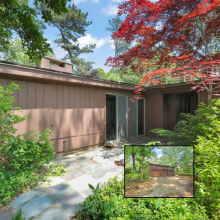Conservation Commission proposes new wetlands bylaw
Special Town Meeting voters refused to pass a wetlands bylaw in 2010, but the Conservation Commission has drafted a new, shorter version in the hopes that officials and residents will be more favorable to it in 2015.
“I just thought it would probably be a good time to see if the town would be willing to consider a bylaw, a simple bylaw that would provide that extra protection to the town,” said Chair Bob Rogers.
The new bylaw is one page long with two sections as opposed to the detailed eight-page, 17-section version from fall 2010.
“The current version is very straightforward. The prior version was very complicated,” said Rogers. “People could oppose it for a lot of different reasons. I’m hoping that there’s not a lot to criticize with the bylaw that we’re trying to promote.”
The bylaw would allow the town to have more control over issues involving “wetlands, water resources and adjoining land areas,” including activities that might affect aquaculture, recreation areas and the water supply.
More importantly, the bylaw would give the Conservation Commission more control over its decisions, rather than allowing those denied a permit to appeal to the Department of Environmental Protection. Rogers said any appeals would go to court rather than to the DEP.
The commission’s decisions have been overturned by the DEP on many occasions, said Rogers, the most recent of which was the January reversal of a permit for a 290-foot pier on Goodspeed Island. Issues with Leisure Shores Marina and alleged environmental transgressions have also taken a long time to resolve as appeals have been filed at the state level.
“This is something that would definitely give the town more control over defending the decision of a commission or any other actions,” said Rogers. “There are times when we feel like we’re making reasonable decisions and the DEP goes ahead and overturns them … For the most part the decision of the commission has been overturned almost every time.”
He said the purpose was not to go beyond the rules of the state Wetlands Protection Act. The proposed bylaw does state that it is intended to “protect additional resource areas, for additional values, with additional standards and procedures stricter than those of the Wetlands Protection Act and Regulations…”
Whether the bylaw makes it onto the Annual Town Meeting agenda is still a question.
The draft has been posted on the town’s website, and Rogers hopes to present it to Selectmen for their backing.










